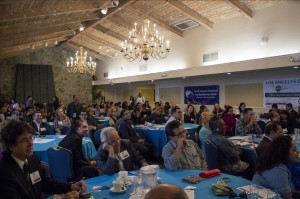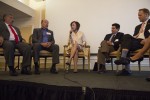Officials from the UCLA North American Integration and Development Center, or NAID center, announced a website Saturday that allows people to discover which immigrant communities are prevalent in certain areas.
Rafael Barrientos, chief information officer of the Ministry of Economy of El Salvador who spearheaded the project to create the website, demonstrated how the site shows certain communities are tied to specific zip codes. He said understanding which ethnic groups are present in which areas is critical to helping immigrants assimilate into society.
Leaders and experts from different countries discussed the social and economic causes of global immigration issues at the Los Angeles Diaspora Forum, hosted by the UCLA NAID Center for the third time at the Faculty Center on Saturday.
Raúl Hinojosa-Ojeda, founding member and director of the UCLA NAID Center and an associate professor of Chicana/o studies, said he thinks the forum is critical for solving immigration issues because it presents multiple perspectives on a far-reaching problem.
“With more languages spoken in Los Angeles than anywhere else in the world, this city is the capital of global diaspora,” Hinojosa-Ojeda said. “Now (the website) shows us just how diverse this community is.”
The event concluded Global Diaspora Week, an initiative created in 2011 by then-Secretary of State Hillary Clinton to encourage international collaboration on the issue of immigration.
“By bringing in a diverse group of people who have worked closely on immigration policy or hands-on with immigrants, you put yourself in a position to create the best solution possible,” Hinojosa-Ojeda said.
The event consisted of four panel discussions on transnationalism and immigration in America. Experts on immigration policy from El Salvador, Mexico, Bangladesh and the U.S. shared their work on immigration and integration of diaspora communities.

Alfredo Cuecuecha, president of El Colegio de Tlaxcala in Mexico, shared data showing how a lack of immigration reform, mistrust of banks and lack of financial knowledge make migrant households vulnerable to abusive interest rates and prevent them from benefiting from the financial system.
“When these households have access to fair loans and financial services, we see a direct connection to less poverty, more education and more housing investments,” he said.
Maribel Marin, executive director for the nonprofit 211 LA County, which collaborates with nationals and undocumented individuals, said she thinks it is important to help children of immigrants who are at a disadvantage because they lack proper nutrition and parental care.
“If you don’t address the problem at a young age, you foster an entire generation that needs to be supported by the community, which is more expensive for us in the long run,” Marin said.
Felicia Escobar, special assistant to President Barack Obama for immigration policy and UCLA alumnus, discussed a series of immigration projects that the U.S. government is currently working on. She detailed Pathways Innovation, a community-based initiative intended to address migrants’ challenges in their local communities, and Deferred Action for Childhood Arrivals, or DACA, which gives qualified adolescent immigrants a renewable work permit and exemption from deportation.
“Immigrants and refugees in this country are the future of our workforce and economy,” she said. “We want to give them access to education, to make sure they are learning the language and availing of the immigration options available to them.”
Sophia Sleap, a graduate student in Latin American studies who attended the forum, said she thinks it is important for leaders and experts to share their data on and experience with immigration.
“The U.S. government and political economy has so much power that it’s dangerous not to consult other countries on this issue,” she said. “It is society’s duty to do everything it can to ensure a certain quality of life for everyone.”
John Spinella, a fourth-year global studies student who has taken Hinojosa-Ojeda’s class, said it was refreshing to hear multiple perspectives on immigration.
“Previously, I’ve only ever listened to a single professor lecture or read articles about these subjects,” he said. “Today I learned what kind of people seek their livelihoods overseas and how they participate in economic systems.”
